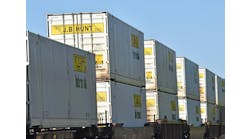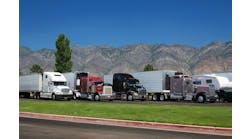Handling expedited freight, as well as other carrier services, is what Scott Long does. He's the expedite manager for GKN Freight Services whose final customer, 90% of the time, is a facility of parent company GKN, a supplier of automotive components and systems as well as powder metal parts. GKN manages expedited, lessthantruckload (LTL) and less-than-container (LTC) operations out of Van Wert, Ohio.
As inbound freight reaches an airport or seaport, notification is sent to the Van Wert office, which coordinates shipments to final destinations. However, most sea shipments are full container loads that are handled elsewhere.
"We are non-asset-based," explains Long. "We have a core carrier fleet of trucks that run certain lanes for us from our Van Wert hub. Here we consolidate and prioritize the freight — whatever our plants need — and we'll ship it out to their vendors. At the same time, we're picking up freight at all those vendors and moving it back to the individual plants."
The GKN network of core carriers is fairly limited in its coverage. "Once we figure out what they can do," says Long, "we go outside and fill in the gaps with LTL carriers — either national or regional."
GKN Freight Services determined that certain LTL carriers are better in serving certain lanes than others. Some offer a one-day service to a given location that another LTL carrier might not. That knowledge is put to work within the GKN, which also includes expediters.
"The carriers we use on the expedited side all offer web-based tracking," Long notes. "It's a basic requirement to be in our top group of carriers. I can go online any time and see where the freight is. If a shipment is running behind, I'll call the carrier to ask what's happening, then notify my customer if there is an issue."
The Van Wert hub was established to serve 30 plants nationwide. Long points out that Van Wert has gone from handling none to $55 million in annual transportation spend in the six years since it began operations.
At the outset, the office's primary function was to expedite freight. Since then its responsibilities have grown into a 24/7 operation handling LTL freight, domestic expedites, air charter, air cargo and nextflightout. It offers all of those options to its customers.
"Typically one of our plants will give us a call," says Long, " providing shipment details on number of pieces and weight, when it will be ready and when it has to be delivered. That determines the mode of transportation. We might respond, 'We know that you need it delivered by 6:00 in the morning, but if you can live with 8:30 instead, we can do the move a lot less expensively.' It's the facility's choice. It's time and distance that determine shipment parameters."
To conduct business in Mexico, GKN uses an expedited solution from FedEx Custom Critical. GKN recently purchased a Mexican company, Velcon, an automotive joint venture it had previously shared with Grupo DESC, one of Mexico's largest industrial companies. GKN ships components to Velcon for final assembly and return to the U.S.
FedEx Custom Critical introduced point-to-point airfreight service to and from Mexico in October 2003. Then, in January 2005 it expanded its surface expedite Mexico and Canada services to ground transit. The service provides specific, to-the-minute pickups and deliveries with exclusive-use vehicles that carry just one customer's shipments per vehicle for complete custodial control throughout the transit.
"Custom Critical provided information on its new service to us in January and I thought we probably wouldn't need it," Long remembers. "Two weeks later a Mexican plant that supplies our Sanford facility fell behind in its deliveries. Once a plant falls behind, it's their responsibility to pay to get the freight to the right facility to help the line catch up. The Mexican plant scheduled a different expedited delivery and it was still late. Our GKN Sanford customer asked if we'd be willing to take on the expedited delivery responsibility. With the information we had from FedEx Custom Critical, we were happy to take on the business."
GKN Freight Services not only serves its own family but now thanks to its buying power, it's able to sell its services to other companies as well. "In the last six months to a year, we've had a larger push on outside business," claims Long. "Early on we wanted to get our family business perfected before we went beyond to secure outside business. We've done so and it is now going very well for us."
Last year, the ground parcel shipping segment gained 8% of the transportation market share, nearly all of that gain at the expense of domestic air shipments, notes William Liddicoet, manager of applied research and analyticalservices for market analyst firm Colography Group. Comparing 2000 with projected expedited cargo shares by mode for 2005, Colography sees less-than-truckload (LTL) and export air remaining relatively flat for the period.
However, there has been a subtle shift in mode choice for some shipments, as investment banking firm Bear, Stearns & Co. found as 2004 turned to 2005.
"Although a majority of our shipper respondents have not changed their preference from ground to air parcel due to the improving economy and the need to get products to market faster," the company notes, "we are starting to see a significant increase in those who are moving products to air rather than ground."
At the end of the first quarter of 2005, equity research firm Morgan Stanley found that the trend to pull back from overnight and next-day delivery and from deferred and second-day to ground transport is a continuing market trend.
2004 was a good year for those in premium transportation, agrees Ed Conaway, president of expedited carrier, ConWay Now, largely because of problems other modes encountered. "The West Coast ports were running behind while truckload carriers were hit by capacity [problems], and before long a lot traffic moved to ground expedite carriers. we saw that most of last year. So far in 2005 there has been more capacity in the market, but in the second half of the year, capacity will start getting tight again."
Conaway sees shippers generally selecting the best value, requesting premium transportation only when it's really needed and with understanding of the costs involved.
Con-Way Now's sister, Con-Way Full Load, is a truckload and intermodal brokerage company. Full Load will utilize a number of Con-Way Now tractor-trailers during the first half of the year. As capacity tightens and the expedite market starts to grow, Con-Way Now will use those trucks for expedited business, keeping its fleet of tractor-trailers busy yearround to service both truckload and ground expedite.
Con-Way Now's business is built around its own fleet of satellite-monitored trucks, with delivery to the minute.
The guarantee is if a delivery is more than four hours late, it's free. "Generally, as soon as a customer calls saying they need a certain size load moved from one point to another, we'll enter that information into our system, which pings all of our trucks. In a matter of seconds we can tell a customer where a truck is, how quickly it can reach them, what time the shipment can be delivered and the cost of the service. Then the customer can look at the fit because they now have all of the information needed to make a decision."
When capacity begins to shrink headed into the fall peak season, shippers may have to increasingly turn to expediting some shipments to meet final customer time requirements. Brokers and third parties can play an important role in finding the right expediter for moving critically important shipments.
"What we try to do at any one moment is find the carrier that can best meet the customer's service requirements," says Bill Klotz, vice president of operations with Universal Traffic Services Inc., a third-party logistics provider (3PL) of truckload, LTL and expedited services.
As UTS considers distance and a profile of each shipment, it might be better to fly it than to put it on a truck. UTS has tools within its custom-built software that examine the shipment profile and make the client aware of available alternative options. Because of premium costs, no one wants to expedite unless they are really forced to do so.
"For parcel," notes Klotz, "air has become a viable solution in some cases. We do take advantage of some of the dedicated services being offered by the LTL community, but only if they work for the client."
Although clients can track and trace shipments through a carrier's website, they are encouraged to go to the UTS website, which posts details in real time. If there are other shipments, there is the opportunity to see all of them at one time.
Additionally, all notes and conversations that took place with the carrier before the shipper placed the order are posted on screen. The shipper can see the interaction between UTS and the carrier and get updates.
resources
Bear, Stearns & Co. www.bearstearns.com
Colography Group www.colography.com
ConWay Now www.con-waynow.com
FedEx Custom Critical www.customcritical.fedex.com
GKN Freight Services www.gknfreightservices.com
Morgan Stanley www.morganstanley.com
Universal Traffic Services Inc. www.utsnet.com


